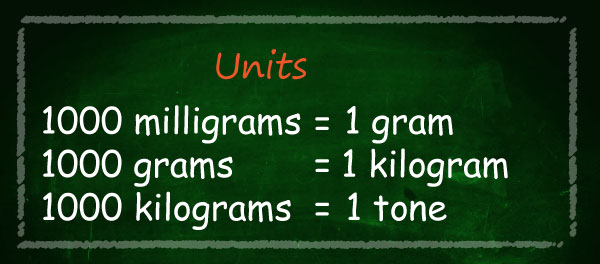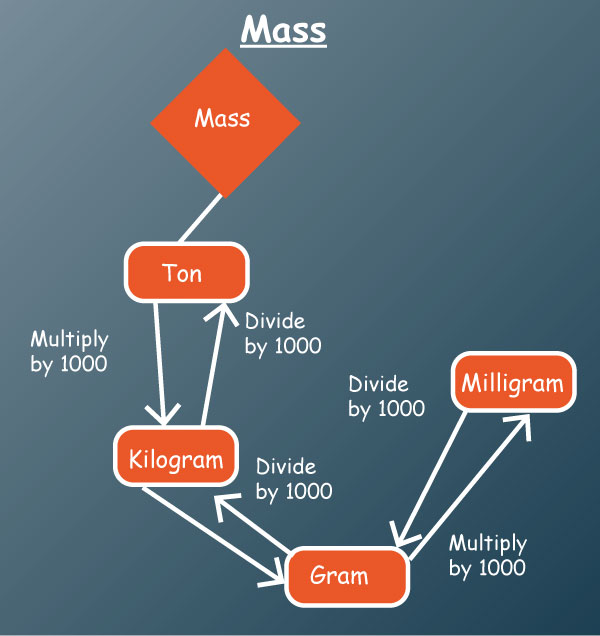| Mass |
|---|
| Assessment Questions |
Mass: How much matter is in an object.
We measure mass by weighing, but weight and mass are not really the same thing.
Mass can be measured using the following units:
Grams are the smallest, Tonnes are the biggest.
To work out conversions involving units of mass we use the relationships.


A supermarket received a load of tea of mass 1.2 t, the tea was later packed into equal number of 500 g and 150 g packets.
Calculate:
1. Total number of packets and amount of tea that remained
2. Amount of tea packed in 150 kg packets.
1.2t = 1.2 X 1 000 000 g
= 1 200 000 g
have a mass of 500 g + 150 g = 650 g
Number of packets of each category of packets is
1 200 000 / 650
= 1 846 packets remainder 100 g
Total number of packets
= 2 X 1 846 = 3 692 packets
Amount of tea left over is 100 g
Mass of 1 846 packets = 1 846 X 150 g
= 276.9 kg
A paperclip weighs about 1 gram.
Does that weigh a lot?
No. A gram is very light.
That is why you often see things measured in hundreds of grams.
Grams are often written as g (for short), so "300 g" means "300 grams".
A loaf of bread weighs about 700 g (for a nice sized loaf)
Once you have 1,000 grams, you have 1 kilogram.
A dictionary has a mass of about one kilogram
Kilograms are great for measuring things that can be lifted by people (sometimes very strong people are needed of course!)
Kilograms are often written as kg (that is a "k" for "kilo" and a "g" for "gram), so "10 kg" means "10 kilograms".
When you weigh yourself on a scale, you would use kilograms.

An adult weighs about 70 kg.
How much do you weigh?
But when it comes to things that are very heavy, we need to use the tonne.
Once you have 1,000 kilograms, you will have 1 tonne.
Tonnes (also called Metric Tons) are used to measure things that are very heavy.
Things like cars, trucks and large cargo boxes are weighed using the tonne.
This lorry weighs about 5 tonnes.
Tonnes are often written as t (for short), so "5 t" means "5 tonnes".
A: Not really.
This makes it heavy enough to show a weight of "100 kg".
An objects weight is how hard gravity is pulling on it.
But in orbit it would not push on the scales at all.

An object's mass doesn't change (unless you remove some), but its weight can change.
So Why Do People Say Weight instead of Mass?
People often use "weight" to mean "mass", and vice versa.
Because gravity is pretty much the same everywhere on Earth, we don't notice a difference
Here are some conditions where the Weight might change:
Class 8
1. A container with shoe polish weighs 50 g. What is the weight in tonnes of 600 such containers?
A. 0.3 B. 3 C. 0.03 D. 300
2. A carton containing books weighs 2 kg, The weight of the empty carton is 0.5 kg. What is the total weight of the books contained in 100 such cartons?
A. 50 kg B. 150 kg C. 200 kg D. 250 kg
3. An empty carton weighs 1 kg. Ten packets of soap powder, each weighing 500 g, are packed in one carton. What is the weight of fifty such cartons full of soap?
A. 50 kg B. 75 kg C. 250 kg D. 300 kg
4. A certain powder is packed in 1250 g packets. How many such packets will weigh one tonne?
A. 8000 B. 800 C. 80 D. 8
5. Five hundred kilograms of ta were packed in 500 g packets. How many packets were obtained?
A. 10 B. 100 C. 1000 D. 10000
6. A lorry carried 50 cartons of books and 200 cartons of milk. Each carton of books weighed 40 kilograms and each carton of milk weighed 5 kilograms. What was the total weight, in tonnes, of milk and books?
A. 30 tonnes B. 1.25 tonnes C. 3 tonnes D. 8.25 tonnes